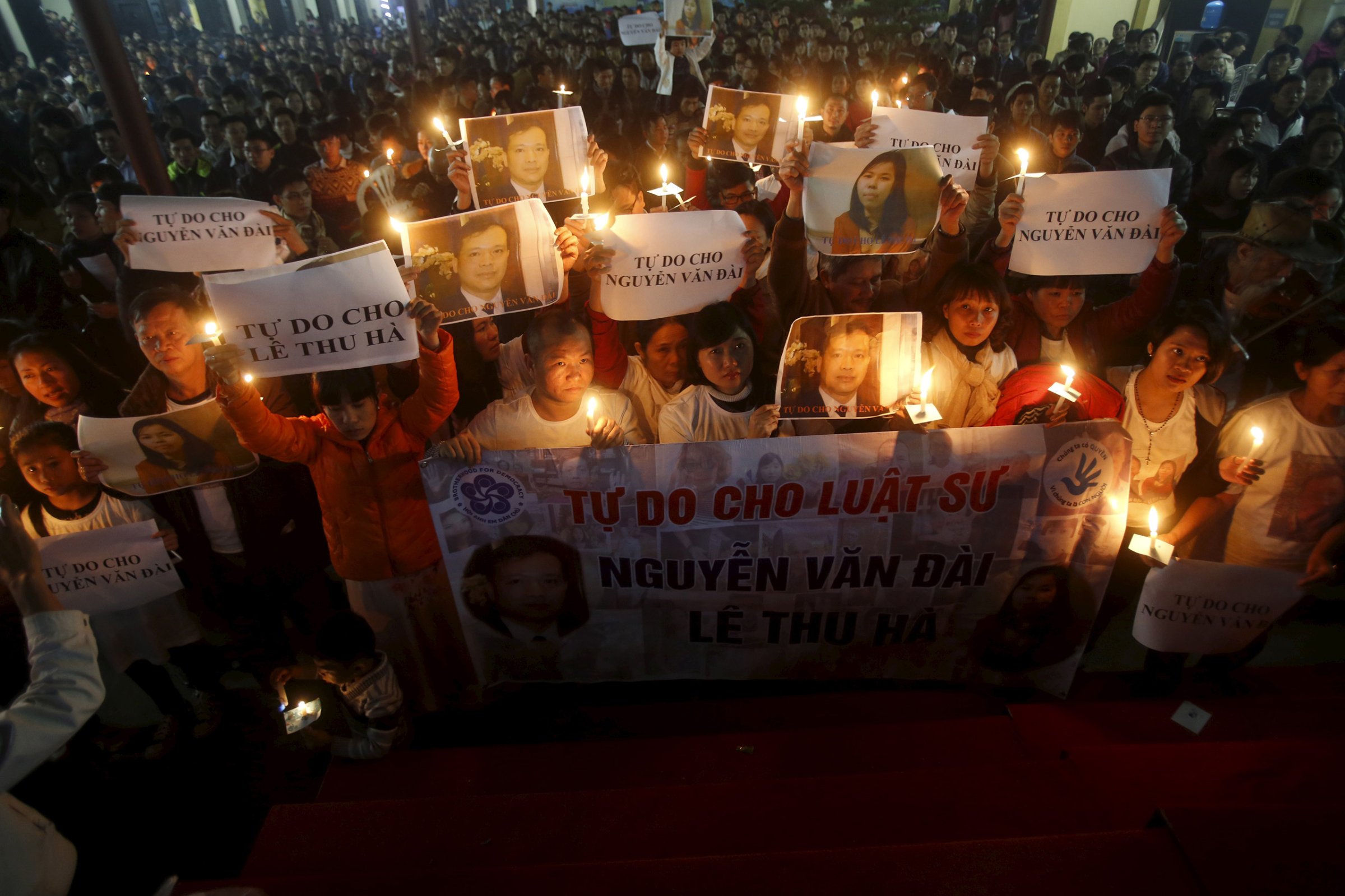
Vu Minh Khanh was recently in Washington to address a congressional hearing. As the wife of the respected Vietnamese human-rights lawyer Nguyen Van Dai, she vividly recalled her husband’s ordeal. He has been missing ever since he was arrested last December. She knows he is in police custody but is unaware of his whereabouts and fears for his well-being.
This week President Barack Obama will become the fourth successive U.S. President to visit Vietnam. As a president who hopes to carve out a legacy by ending Washington’s disputes with old Cold War enemies, Obama wants to court Vietnam as a potential ally. But, as Vu appealed to lawmakers, he shouldn’t leave human rights behind in the overhead compartment as he descends the steps of Air Force One.
Despite the tentative steps it has taken toward economic and political reforms, Vietnam very much remains a closed country. All political power lies firmly with the ruling Communist Party, which carefully monitors public and private lives. There is no independent media, and civil society groups cannot legally register themselves unless they submit to the Communist Party’s control.
Dai has been arrested before. In 2007, he was charged with “conducting propaganda against the state”—an offense for which human rights activists are routinely convicted. Dai endured four years in jail. Upon his release, his movements were restricted to the environs of his home. In December 2014, while sitting at a nearby bar with students and lawyers, six men in plainclothes physically attacked him.
For Dai, events repeat themselves, albeit with progressively worse consequences. Last December, he was beaten yet again by 10 attackers, moments after leading a training course on human rights. A few days later, he was arrested and charged once more with conducting propaganda against the state. Dai faces up to 20 years in prison and under Vietnam’s prison regulations, repeat offenders are imprisoned under harsher conditions than first time offenders.
Amnesty International has identified 82 other Vietnamese prisoners of conscience like Dai, and believes there are more. These are men and women who have been jailed solely for their peaceful activism and voicing of their views.
Meanwhile, the fallout from an ecological disaster has seen the government carry out a fresh crackdown. A suspected leak from a steel plant led to the destruction of vast stocks of fish in the country’s coastal provinces, sparking sizable demonstrations in cities throughout the country.
Such coordinated activity represented the first real challenge to the country’s new political leadership, installed at the Communist Party’s Congress earlier this year.
Far from breaking with the past, and engaging with protestors outraged by the despoiling of their surroundings, the new leadership resorted to old tools of repression. No answers were offered to those who demanded an explanation for the cause of the environmental disaster. Instead, protestors were beaten and several were detained for hours.
One journalist who sought to uncover the truth of the environmental disaster himself, Truong Minh Tam, was snatched by the police and says he was subjected to six days of torture.
Last week in Washington, Vu told lawmakers that she doesn’t know where her husband, is being held. He has not been allowed to meet relatives or to enlist the services of a lawyer. While she believes Dai is being held at a detention facility in Hanoi, she cannot be sure as it is common practice for authorities to constantly move prisoners from one facility to another, keeping them disoriented and untraceable.
For Dai and others, such conditions could trigger health complications. He suffers from Hepatitis B, but as his wife Vu testified, she has no way of knowing whether he is receiving the medical treatment he needs. The authorities have a track record of withholding treatment to those in need as a means to coerce “confessions.”
In his meetings with Vietnam’s political leadership, President Obama must insist on the release of Dai and other prisoners of conscience and press his counterparts to allow peaceful demonstrations relating to the fish deaths and any other public issue to proceed. No deal on trade and security should come at the cost of these key human rights.
More Must-Reads from TIME
- Donald Trump Is TIME's 2024 Person of the Year
- Why We Chose Trump as Person of the Year
- Is Intermittent Fasting Good or Bad for You?
- The 100 Must-Read Books of 2024
- The 20 Best Christmas TV Episodes
- Column: If Optimism Feels Ridiculous Now, Try Hope
- The Future of Climate Action Is Trade Policy
- Merle Bombardieri Is Helping People Make the Baby Decision
Contact us at letters@time.com